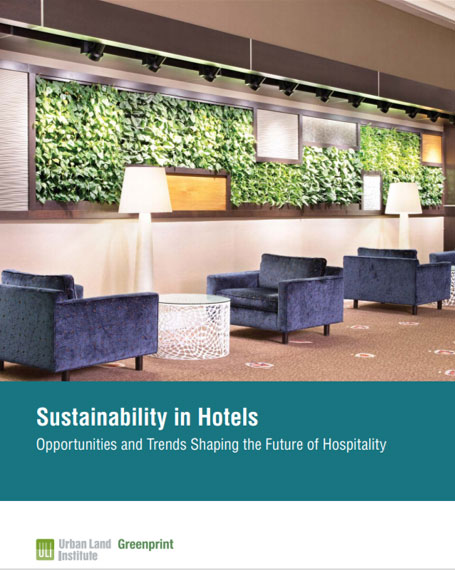Sustainability in Hotels Explores Growing Emphasis On Green Building Practices in the Hospitality Industry
A new report from the Urban Land Institute (ULI) suggests that sustainable building practices, including those involving energy and water conservation as well as waste reduction, are increasingly being incorporated throughout the hotel sector to add value and provide a competitive edge to properties.
Sustainability in Hotels: Opportunities and Trends Shaping the Future of Hospitality assesses the state of sustainability in the hotel sector by identifying best practices, highlighting industry trends in sustainability, and offering solutions to sustainability-related obstacles. The report, published by ULI’s Greenprint Center for Building Performance, contains case studies and is informed by insights from 25 leading hotel owners, developers, and investors, including members of ULI’s Hotel Development Product Council and Recreational Development Council.
“Sustainability efforts, both in construction and operations, speak to the character and development quality of a hotel property, and a responsible developer recognizes both the need and the benefits that come with going green,” says James DeFrancia, ex officio member of the Recreational Development Council and Principal of Lowe Real Estate.
Sustainability in Hotels points out that of all commercial buildings, hotels are among the highest per-square-foot energy and water users, and that carbon emissions for full-service hotels exceed emissions for limited-service hotels. However, it notes that opportunities are available across all hotel types for improvements that go far beyond existing “sustainable choice” programs such as those limiting linen changes or curbing water use by guests. Trends highlighted in the report include:
- Modular construction – The use of prefabricated and identical modules built offsite and transported to the construction site to form the structure. Modular construction reduces construction time, minimizes waste, requires far less energy use, and standardizes quality across assets.
- Sustainable renovations — Incorporating sustainable fixtures and furniture into hotel room renovations. This can help reduce the property’s carbon footprint and help showcase the hotel’s commitment to sustainability.
- Smart guest room technology – The use of technology to conserve energy, from allowing guests to control the room temperature to in-mirror televisions.
- A heightened focus on health and wellness – Improving fitness offerings with amenities such as rental workout gear and in-room fitness equipment; and health-focused features such as aromatherapy, advanced water purification systems and circadian lighting that triggers the body’s natural rhythms for rest and wakefulness.
“Sustainability in hotel development is not a short-term trend; rather, it’s a lasting change,” says ULI Global Chief Executive Officer W. Edward Walter, former CEO of Host Hotels and Resorts, Inc. “It’s what the market wants — younger and older generations place a high priority on green and sustainable development. It’s also what cities want and need, as they seek to become more resilient, competitive and livable. Clearly, resource-efficient and resilient development practices are good for the hospitality industry as well as our communities.”
While long-term investments in high-efficiency energy management systems, heating, ventilation and air conditioning retrofits, and on-site renewable energy all require substantial planning and collaboration between owners and operators, such investments can pay long-term dividends for hotels in terms of utility savings, improved guest experiences, and increased net operating income, the report notes.
Sustainability in Hotels cites several factors spurring hotel owners’ interest in sustainability:
- The desire to meet guest expectations for hotels to have in place environmental programs;
- The need to comply with increasingly relevant government regulations related to carbon emission reductions and energy efficiency;
- The desire to achieve internal sustainability goals; and
- The anticipation of greater interest in sustainability by future investors.
Based on the expertise shared by the interviewees, the report outlines best operational best practices as well as technical improvements to improve efficiency, cut carbon emissions and reduce operating costs. “The conversation around climate change and changing hotel guest demographics helped the global hotel industry recognize that sustainability is a smart business decision that can elevate the guest experience and strengthen financial returns,” says ULI Hotel Development Council Chair Toni Alexander, president of InterCommunications.
The case studies in Sustainability in Hotels include energy efficiency programs implemented by Hersha Hospitality Trust; The Fairmont Hotel in Washington, D.C.; and Host Hotels and Resorts; water conservation programs implemented by Clarion Partners and MGM National Harbor in Oxon Hill, Maryland; the waste management program used by the Grand Hyatt Singapore; the natural environment program implemented by Terranea Resort in Rancho Palos Verdes, California; smart room guest technology at the Sinclair Hotel in Fort Worth Texas; and the health and wellness program in place at Limelight Hotel Snowmass in Snowmass Village, Colorado.
Sustainability in Hotels adds to ULI’s ongoing work to promote sustainable development practices and improve the resilience of communities worldwide, and to highlight the Institute’s role in helping to mitigate the effects of climate change that are related to the built environment.
ULI’s Greenprint Center for Building Performance is part of the Institute’s Center for Sustainability and Economic Performance, which is dedicated to creating healthy, resilient, and high-performance communities around the world. Greenprint is a worldwide alliance of leading real estate owners, investors and strategic partners committed to improving the environmental performance of the global real estate industry through measurement, benchmarking, knowledge sharing and implementation of best practices.







